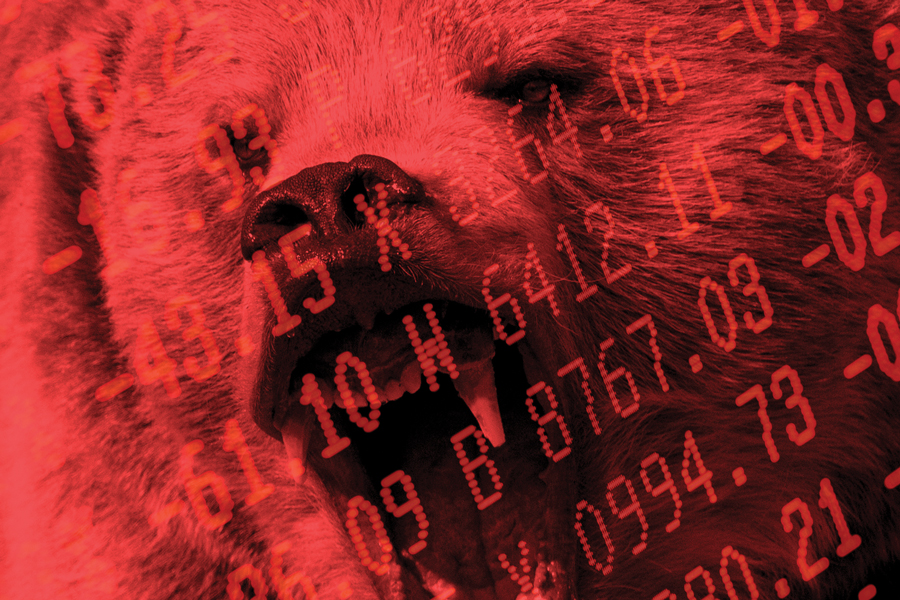

Last week’s equity drubbing made it official: The stock market is in bear territory. Now that the feared decline has arrived, what’s next?
Given stubbornly high inflation, the Federal Reserve’s intent to stomp it out by raising rates, and widespread fears of a recession, the bear is likely to keep growling for a while. Veteran advisers who have experienced bear markets in the past know the pain. They also know that not all bear markets are alike and that amid the gloom, there also are silver linings.
Here are four bear market facts worth noting:
1) The stock market always recovers. That sounds Pollyannaish, especially when investors are experiencing painful losses and fear that their life savings will vanish. But there’s no refuting that the market always comes back. Sometimes the recovery takes a while — which retired investors or those just about to retire rightfully are concerned about — but there’s comfort in knowing that sufficient time heals most stock market wounds.
2) For many investors, tomorrow’s prices are more important than today’s. For younger clients, whose investment runway spans many years and even decades, a bear market now is of far less consequence than it is for older investors. By investing in the stock market today, younger investors are engaging in a kind of generational dollar-cost averaging, helping them acquire assets when prices are lower, which will benefit them many years from now when, as history has shown, stock prices continue their upward march.
A bear market may be a game changer, but it’s not a game stopper.
3) Months? Years? Who knows how long the bear will growl? History shows 28 bear markets since 1928, with an average decline of 35.6% and an average length of 289 days. While the bear market triggered by the Covid outbreak in 2020 was almost average in terms of losses, producing a nearly 34% decline, it was one of the shortest on record, lasting only 33 days. One of the longest uninterrupted bear markets lasted from November 1968 to May 1970, even though the market’s loss was average (36%). One lengthy and powerful bear market produced a 48.2% decline and lasted 630 days, dragging on from January 1973 to October 1974. Our current bear has echoes of that one, which was triggered by the OPEC oil embargo and skyrocketing gasoline prices, which unleashed a wave of inflation. It’s worth noting, too, that bear markets often precede or coincide with a recession but sometimes don’t.
4) Bear markets present opportunities. The turmoil and economic uncertainty surrounding a bear market creates anxiety and confusion among investors and potential investors. In such an environment, guidance from a trusted financial adviser is more valuable than ever. Retirees and near-retirees need help in finding creative ways to preserve their wealth and maximize income in trying times. For younger investors perhaps less concerned about losses, the heightened emphasis on personal finances that comes with the stock market being in the news every day also presents an opportunity. As many of this year’s 40 Under 40 honorees can attest, there’s a tremendous need for financial advice in areas that have little or nothing to do with the stock market. These industry leaders of tomorrow understand that a bear market may be a game changer, but it’s not a game stopper.

Rajesh Markan earlier this year pleaded guilty to one count of criminal fraud related to his sale of fake investments to 10 clients totaling $2.9 million.

From building trust to steering through emotions and responding to client challenges, new advisors need human skills to shape the future of the advice industry.

"The outcome is correct, but it's disappointing that FINRA had ample opportunity to investigate the merits of clients' allegations in these claims, including the testimony in the three investor arbitrations with hearings," Jeff Erez, a plaintiff's attorney representing a large portion of the Stifel clients, said.

Chair also praised the passage of stablecoin legislation this week.

Maridea Wealth Management's deal in Chicago, Illinois is its first after securing a strategic investment in April.
Orion's Tom Wilson on delivering coordinated, high-touch service in a world where returns alone no longer set you apart.
Barely a decade old, registered index-linked annuities have quickly surged in popularity, thanks to their unique blend of protection and growth potential—an appealing option for investors looking to chart a steadier course through today's choppy market waters, says Myles Lambert, Brighthouse Financial.
